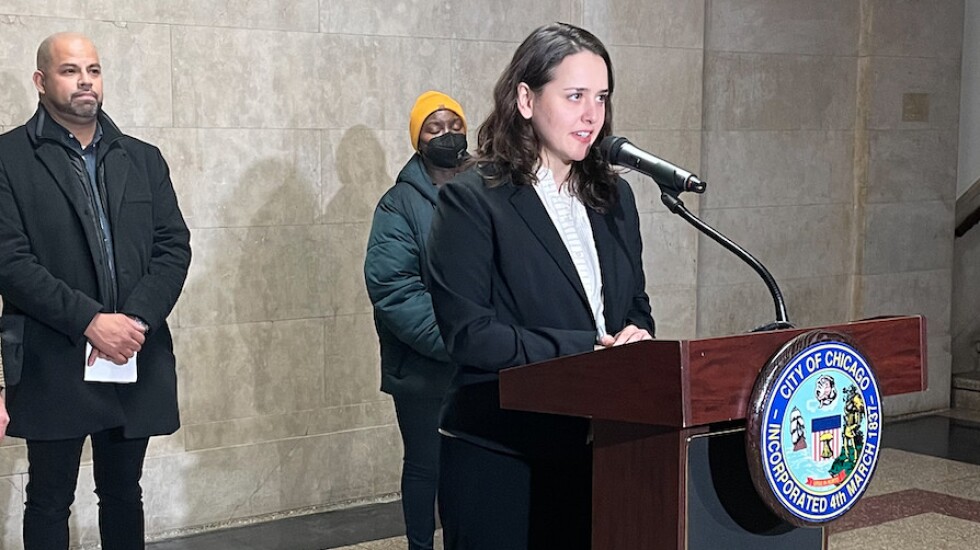
Marina Ross’ 2-year-old son, Rafi, was killed earlier this year when a driver on a scooter struck the child in a Lincoln Square intersection.
A week ago would’ve been his 3rd birthday.
“Now I look at the calendar and have to call the funeral home to choose his grave marker,” she said.
Ross spoke about the need for pedestrian and bicycle safety ahead of the Bike Lane Enforcement Ordinance’s passage at Wednesday’s City Council meeting. The law makes it easier to ticket and tow drivers parked in bike lanes and would require signs to warn bikers of closed lanes. It also raises fines to $250 for drivers blocking paths.
The hope is that drivers will get the message to stop parking in bike lanes — a practice that forces cyclists and people on scooters to move into lanes of traffic and risk being hit or hitting others.
Rafi’s death was part of a pattern of young people killed by drivers earlier this year.
“Walking, biking, riding a mini scooter are safe activities. Driving is unsafe,” Ross said. “Drivers should hold themselves accountable, and if they can’t do that, we should hold them accountable.”
Ald. Andre Vasquez (40th) said the ordinance is a first step in making sure the city actually enforces the law against people parking in bike lanes. Once drivers get the message, the streets will be safer for bikers and pedestrians, Vasquez said.
The ordinance:
- Expands who can ticket cars parked in bike lanes to include Chicago police, the Chicago Department of Transportation, Streets and Sanitation, and it allows the Department of Finance to direct Streets and Sans to tow vehicles.
- Increases fines to $250 from $150 for parking in bike lanes, beginning 10 days after passage of the ordinance.
- Requires signs to be posted wherever a bike lane is closed for construction or other purpose. Signs need to be placed 24 hours before a lane is closed. Vasquez said this law would’ve prevented the death of Lily Grace Shambrook, who was struck and killed by a semi driver while her mother biked around a truck illegally parked in a bike lane. A fine for violating that rule ranges from $500 to $2,500.
- Requires CDOT to remove work permits from anyone who violates the prohibition of blocking bike lanes, or for not placing signage beforehand.
- Requires the Department of Finance to propose a pilot program to City Council by February for automated camera enforcement of bike lanes.
Courtney Cobbs, a cycle safety advocate, said she encounters drivers illegally parked in bike lanes every day.

Weeks ago, Cobbs encountered a truck parked in a bike lane in Edgewater. She waited around while a 48th Ward employee tried and failed to ticket and tow the driver. After an hour, the truck was still parked illegally in the lane, she said.
“Keeping our bike lanes clear is vital to the lives of cyclists,” Cobbs said.
Drivers struck at least 439 cyclists in bike lanes from January 2020 to July this year, according to an analysis by Block Club Chicago and the Illinois Answers Project.
Ald. Daniel La Spata (1st) hears so many stories about children dying in crashes with drivers that he’s terrified that he may not be able to — one day — put his 3-month-old child on the back of a bike.
He said children are “dying in crashes that are utterly and completely preventable.” The bike lane ordinance is the first step in ensuring the city’s bike lane infrastructure actually acts as its intended, he said.
“The next step is making sure these citations actually get issued — that we actually create protection in the infrastructure that we created so that no one loses another life in this city because they’re cycling, on scooters, walking,” La Spata said.
Vasquez said an initial version of the ordinance had a public enforcement component, where citizens could photograph illegally parked cars and submit those to the city for ticketing. But Vasquez scrapped that part of the ordinance after hitting resistance.
Instead, Vasquez said the committee agreed to work on a downtown pilot where automated cameras would photograph and ticket drivers illegally parked in bike lanes. Those conversations are still happening, but the idea is to have 10 cameras that may first issue a warning to drivers, Vasquez said. He hopes the pilot could expand citywide.
“We want to make sure ... people know that if you park in a bike lane, you’re going to get a warning, or ticket or something,” he said.
Vasquez said he plans to continue working on passing a public enforcement component, where citizens could help issue tickets by calling 311 or taking photographs of parking offenders.







